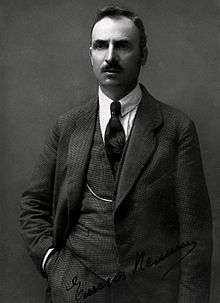Elin Pelin
Elin Pelin (Bulgarian: Елин Пелин) (8 July 1877 – 3 December 1949), born Dimitar Ivanov Stoyanov (Bulgarian: Димитър Иванов Стоянов) is arguably considered Bulgaria’s best narrator of country life.
Elin Pelin | |
|---|---|
 | |
| Native name | Елин Пелин |
| Born | Dimitar Ivanov Stoyanov 8 July 1877 Bailovo, Ottoman Empire (now Bulgaria) |
| Died | 3 December 1949 (aged 72) Sofia, Bulgaria |
| Resting place | Central Sofia Cemetery |
| Genres | story, impression, poem, novel |
| Subject | the Bulgarian village |
| Notable works | "Kind is the Fatherland" (1895) |
| Children | 2 |
Biography
Born into a large family in the village of Bailovo near Sofia, he loved writing and reading from an early age. Studying to become a teacher, he taught for a year in 1895 in his native village. He was first published in 1901, and the respect it earned him in literary circles encouraged him to go to Sofia in 1903, where he worked as a librarian at the university library. It was during this period he took his now-famous pseudonym from the word pelin, which means wormwood in Bulgarian. He spent 1906-07 in France, perfecting his skills in the language. By this time, he was already a popular writer.
Between 1910 and 1916, he was the director of special collections at the National Library and also served as editor of numerous magazines, including the children’s publication Veselushka. Additionally, he served as a war correspondent during World War I.
In 1911, one of his most famous works appeared, The Gerak Family (Bulgarian: Geratsite). It is one of the best-known pieces of Bulgarian literature and deals with a traditional village family experiencing the transition from the simplicity of rurality to the modernization of Bulgarian society, a world in which old time practices founded on family love and dedication to the land start to disappear. His second great work, Earth (Bulgarian: Zemya), was published in 1922. In this book, Pelin created a gallery of characters who identified with the national character and conscience.
Pelin’s works—poems, short stories and novels—recreated the peasant and countryside atmosphere of the old Bulgaria. His predilection for short stories led him to write many, of which the humouristic Pizho and Penda is perhaps the best known. A genuine realism, with descriptions full of light and color, classify his works. Considered one of the masters of Bulgarian prose, he was also one of the initiators of Bulgarian children’s literature. His tales of Yan Bibiyan and his voyages to the moon still delight today.
From 1924 until 1944, Pelin served as conservator at the Ivan Vazov Museum, all the while continuing to write, mostly for children, and be published. In 1940, he was named president of the Union of Bulgarian Writers.
After the War, he managed to escape being blacklisted as a forbidden author by the Communist government of the People's Republic of Bulgaria. The regime chose to consider his works as those of a realistic, critical author, а precursor of Socialist Realism who, although not having correctly seized the true nature of the Bourgeois state, knew how to tell about the working life and individual revolt of exploited peasants.
Earth and The Gerak Family, amongst other works, have been filmed several times (1930 and 1957, and 1958, respectively).
The Bulgarian town of Elin Pelin was named after him, as is Elin Pelin Point on Smith Island, South Shetland Islands.[1]
References
External links
- Virtual Library of Bulgarian Literature Slovoto - library of online Bulgarian literature in Bulgarian and a number of other languages.